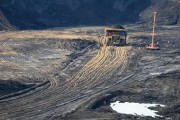In the debate over resource development, “social licence” is seen as a critical factor that can determine which projects go ahead and which don’t make the cut.
As journalist Eric Reguly recently reported, $207,000 may seem like a lot to pay for an ad in the New Yorker, but that’s just a fraction of what the oilsands industry and provincial and federal governments appear willing to pay to sway public opinion on the Keystone XL pipeline.
That’s just one project of many, and one ad in an ongoing advertising campaign hoping to counter the negative perceptions of Canada’s oilsands industry. But it’s a sign of just how critical social licence is. And deploying a fleet of pro-development ads and replenishing the marketing war chest has long been the core strategy for securing it.
A new report from the Canada West Foundation challenges that thinking. From the ground up: Earning public support for resource development makes the case that “Canada’s current ad hoc approach to building public support for resource development is inadequate to the challenges ahead of us.”
It suggests that the current approach to earning social licence needs “a reboot,” with industry focusing on improving performance at the ground level. Specifically, the report notes that Canada must restart the discussion on greenhouse gas reductions because our country’s poor reputation on this issue is “hurting our ability to address perceptions in key markets and to generate support for many resource projects.”
We agree, although we may differ on what the pathway to overcoming these barriers to social licence looks like.
What determines “social licence”?
Social license is generally considered to exist when the perceptions, opinions, and beliefs held by a local population regarding a development allow for the ongoing public approval of the related activity.
 Proponents of resource development talk of the need to “win” social license by increasing or improving public communication about the efforts taken to preserve the environment and create economic opportunities, and the New Yorker ad demonstrates this approach. Opponents, on the other hand, point to protests, blockades, and increased participation at public hearings for resource development as evidence that certain projects, companies or industries as a whole lack the social license necessary to operate in a responsible manner.
Proponents of resource development talk of the need to “win” social license by increasing or improving public communication about the efforts taken to preserve the environment and create economic opportunities, and the New Yorker ad demonstrates this approach. Opponents, on the other hand, point to protests, blockades, and increased participation at public hearings for resource development as evidence that certain projects, companies or industries as a whole lack the social license necessary to operate in a responsible manner.
With major projects increasingly hanging in the balance, public perception of resource development can have a real and significant impact on both a company or industry’s reputation, and the economics of individual projects.
Last week the Corporate Social Responsibility Initiative at the Harvard Kennedy School released a report that sheds light on this issue. The report, Costs of Company-Community Conflict in the Extractive Sector, provides a thorough review of the full range of costs that companies incur when they fail to avoid or repair torn relationships with communities impacted by their operations. The report presented evidence that reputational damage had a higher cost impact than delays in project approvals, as reputational effects endure when companies look to develop new projects or expand existing operations.
The report’s accompanying study — aptly titled “Conflict translates environmental and social risk into business costs" — captures the fundamental impact of social license uncertainty. Yet in Alberta, corporate practices and lax government regulation has resulted in a failure to act on many environmental issues, despite the availability of achievable, economically viable solutions.
Meaningful change, not messaging, required
Unsurprisingly, industry has low credibility when it comes to environmental issues. According to Environics’ Canadian Environmental Barometer (Nov. 2012), only 33 per cent of Canadians place a great deal or some trust in the information provided by industry, compared to 84 per cent who say the same about scientists and 66 per cent about environmental groups.
This lack of trust can undermine a company or industry’s social licence — and this in turn can translate into regulatory delays or trouble securing market access, both of which (as the Harvard study points out) carry real business costs.
"A stable carbon management regime would add to policy stability and social legitimacy." — Michael Cleland, Canada West Foundation
And that brings us back to the Canada West report. Authored by Michael Cleland, the group’s Nexen Executive in Residence, the report suggests developing a systematic approach to resolving environmental concerns, with a focus on public engagement at the local level. Canada West Foundation also recommends improving environmental performance instead of the current strategy of focusing on broad-level communications and marketing efforts.
The report notes that Canada must seriously address the greenhouse gas pollution of resource industries, stating: "…there is little evidence that carbon pricing at that level [of BC's carbon tax] would damage the economy, provided it is balanced by offsetting tax reductions elsewhere. The net benefit/cost might well be positive for resource industries since a stable carbon management regime would add to policy stability and social legitimacy."
From our perspective, Canada West’s recommended approach would be an excellent starting point for implementing on-the-ground, local solutions to the environmental issues that face oilsands development. In Alberta, many of the energy industry’s challenges to earn and maintain social licence can be attributed to the provincial and federal governments’ failures to implement and enforce strong policies to improve environmental performance.
Those policies should create incentives for industry to put available, affordable and practical solutions into practice. As we see with current concerns — over greenhouse gas emissions, water use, tailings management, and wetlands impacted by oilsands extraction — failing to do so makes it much more difficult to argue the case that resources are being developed responsibly, and in the best interests of Albertans and Canadians.
Shifting the focus from marketing to improving environmental performance will be the opportunity to implement local, on-the-ground solutions that already exist for many of the largest issues in resource development. Fortunately, plenty of locally based, achievable solutions exist for challenges related to energy development, such as minimizing the impacts of oilsands extraction or building a responsible LNG industry.
The degree to which Canadians and others will grant social licence to resource development proposals and proponents will largely hinge on whether — and how — industry and governments choose to implement these solutions.









